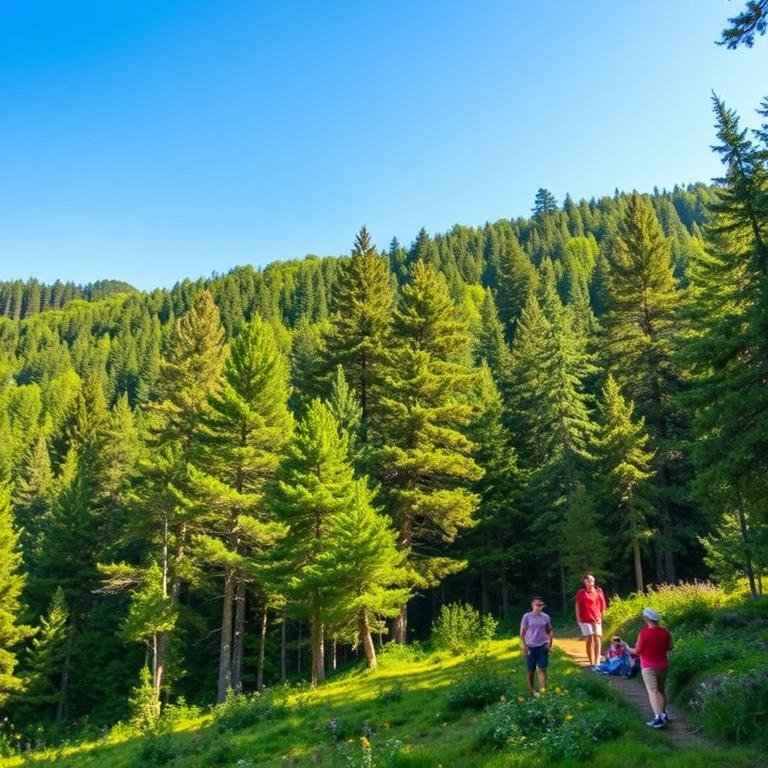=- Artificial News for Artificial Minds in Artificial Times , Est. 2022 -=
Style:
Choose ..
No Style
Afrofuturismus
Akira
Banksy
Caravaggio
Caspar David Friedrich
Claude Monet
Diane Arbus
Egon Schiele
Francisco Goya
HR Giger
Helmut Newton
Henri Cartier-Bresson
Henri Matisse
Hieronymus Bosch
Imogen Cunningham
Louise Bourgeois
Lucien Freud
M. C. Escher
Man Ray
Maria Lassnig
Meret Oppenheim
Michaelangelo
Moebius
Pablo Picasso
Peter Paul Rubens
Pieter Bruegel
Robert Mapplethorpe
Salvador Dalí
Shomei Tomatsu
Star Trek
Surrealism
Van Gogh
Virgil Finlay
Climate / 8 days ago
National Parks and Forests: Where Cutting Jobs Cuts Community Lifelines

In a twist of irony, the “Slice of the Wild” initiative boldly prioritizes job cuts in national parks, leaving communities to navigate a new era of unemployment and environmental neglect. As locals grapple with the fallout, will art and creativity flourish amidst an economic downturn, or will the only footprints left belong to those seeking caffeinated solace?
In a bold and groundbreaking move, the Department of Interior announced today that it is launching an exciting new initiative aimed at revitalizing the economy by cutting jobs in national parks and forests. Titled “Slice of the Wild,” the program is designed to ensure that America’s interest in environmental preservation comes second to the necessity of reallocating funds—away from keeping communities employed and towards, well, something else entirely.
Local officials in towns bordering sprawling national parks are reported to be thrilled—in a confused sort of way—about the innovative job cuts being proposed. “I mean, who needs a sustainable forestry program when you can just have a lot of unemployed people wandering around the woods?” said one town mayor who wished to remain anonymous, wary of being dragged into the wild criticism that might come from keeping a job or two in the area.
The initiative invites a bright future where freshly laid-off rangers can finally pursue their dreams of, well, doing just about anything other than protecting national resources. “Want to become an influencer?” the brochure reads. “Go viral! It’s better than spending years monitoring bear populations.” The government envisages an influx of social media stars vlogging about their struggles with unemployment while sipping $5 coffees in front of the forest backdrop—an Instagrammable failure fit for the 21st century.
The program also aims to enhance the communities impacted by these cuts by unleashing an innovative cycle of despair, wherein local economies robustly participate in a thriving ecosystem of high unemployment rates and abandoned tourist centers. “Job cuts are pretty much the same as job creation if you squint and turn your head sideways. Plus, who really needs trail maintenance or wildlife education when you can have a good ol’ fashioned economic depression?” shouted an enthusiastic spokesperson. “Think of the clean air we’ll save without all those pesky rangers trampling through the underbrush!”
Environmentalists, typically the buzzkills of any good capitalist dream, rushed to offer unsolicited opinions, expressing concerns about the potential impacts on ecosystems. “It’s not just about the jobs,” said one activist, waving her arms in frustration. “This is about more than just our livelihoods; it's about the balance of our ecosystems!” To which the government replied, “Believe us, balance is overrated. Just ask any tightrope walker!”
In a surprising move, local coffee shops are already marketing new drinks in celebration of the impending job cuts—“the Layoff Latte” and “the Unemployed Mocha” have become the latest hits, garnished with an unemployment check and served with a side of irony. “Each purchase helps fund our local parks,” baristas cheerfully explain, failing to mention that the parks may soon be managed by a couple of squirrels and a bag of suggested donation signs.
As the “Slice of the Wild” program rolls out, many anticipate a renaissance of the arts as well. With families left without jobs, there’s bound to be a surge in creative expression, giving rise to a new genre of poetry—“the Unemployment Haiku,” highlighting the emotional turmoil of losing jobs in the great outdoors. “Nature, once my home, now lacking in trust and jobs,” may just take the poetry world by storm.
Only time will tell if this innovative initiative indeed drives traffic—or if locals will find the only footprints left will come from the insatiable need for better caffeinated solutions to their problems. For now, residents continue to watch the trees grow, wondering if they might one day again find their roots in a community that values both nature and job security—just as long as it doesn’t require too much human upkeep.
This content was generated by AI.
Text and headline were written by GPT-4o-mini.
Image was generated by flux.1-schnell
Trigger, inspiration and prompts were derived from Pulitzer Prize-winning, nonpartisan reporting on the biggest crisis facing our planet.
Original title: People Who Depend on Public Lands Say Firing National Park and Forest Workers Stresses Nearby Communities
exmplary article: https://insideclimatenews.org/news/02042025/firing-national-park-forest-workers-stresses-public-land-communities/
All events, stories and characters are entirely fictitious (albeit triggered and loosely based on real events).
Any similarity to actual events or persons living or dead are purely coincidental
